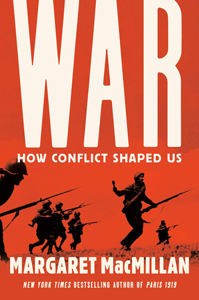 Margaret MacMillan, War: How Conflict Shaped Us (New York: Random House, 2020), 312pp.
Margaret MacMillan, War: How Conflict Shaped Us (New York: Random House, 2020), 312pp.
Margaret MacMillan is emeritus professor of international history at the University of Oxford, where she was the former Warden of St. Anthony's College, and professor of history at the University of Toronto. Her book War was named one of the ten best books of 2020 by the New York Times.
This book makes for very sobering reading when you consider the scale and scope of war, especially given MacMillan's encyclopedic knowledge of the subject—from Ancient Greece and Rome, to classical China, medieval Europe, modern America, the Middle East, and Africa (think of the Rwandan genocide). War has led to over 100 million deaths in this century alone, and certainly to the loss of religious faith for many.
War is a terrifying mystery that is full of paradoxes. It turns some young boys into men, and some good men into beasts. War can bring peace. It can ruin or energize a national economy. War can unite a nation. It brings out both the heroism and the cruelty of humanity. Whereas the instinct to fight might be innate in human nature, war is different—it is, in its essence, a vastly complex form of organized violence, and in that sense it is a uniquely human activity. War is a cause for horror, fascination, and most certainly glorification. As one of the defining features of humanity, says MacMillan, we must never "avert our eyes from something we may find abhorrent. We must, more than ever, think about war."
By some measures the United States is the most militaristic nation on earth. Today the Department of Defense admits that America deploys 254,788 (double that number if you include dependents) military personnel to about 800 military bases in 153 countries (there are 189 countries in the United Nations). That does not include numerous secret and officially "nonexistent" bases. Our own country is home to 969 separate bases in all fifty states. Britain and France have a combined 13 overseas bases. Russia has nine. The United States, observes MacMillan, "allocates nearly two-thirds of its discretionary budget to defense. It spends as much as the next eight spenders combined."
When I finished reading about this dreadful subject I thought of the words of Jesus: blessed are the peacemakers. I also thought about the most famous poem about World War I, Dulce et Decorum Est by Wilfred Owen (1893–1918). The title of the poem comes from a Latin saying (taken from an ode by Horace). The full saying ends the poem: Dulce et decorum est pro patria mori - it is sweet and right to die for your country.
Bent double, like old beggars under sacks,
Knock-kneed, coughing like hags, we cursed through sludge,
Till on the haunting flares we turned our backs
And towards our distant rest began to trudge.
Men marched asleep. Many had lost their boots
But limped on, blood-shod. All went lame; all blind;
Drunk with fatigue; deaf even to the hoots
Of tired, outstripped Five-Nines that dropped behind.Gas! Gas! Quick, boys! – An ecstasy of fumbling,
Fitting the clumsy helmets just in time;
But someone still was yelling out and stumbling,
And flound'ring like a man in fire or lime . . .
Dim, through the misty panes and thick green light,
As under a green sea, I saw him drowning.
In all my dreams, before my helpless sight,
He plunges at me, guttering, choking, drowning.If in some smothering dreams you too could pace
Behind the wagon that we flung him in,
And watch the white eyes writhing in his face,
His hanging face, like a devil's sick of sin;
If you could hear, at every jolt, the blood
Come gargling from the froth-corrupted lungs,
Obscene as cancer, bitter as the cud
Of vile, incurable sores on innocent tongues,
My friend, you would not tell with such high zest
To children ardent for some desperate glory,
The old Lie; Dulce et Decorum est
Pro patria mori.
On November 4, 1918 Owen was shot and killed near the village of Ors. One week later, Armistice bells rang on November 11, celebrating the end of WW I.
For more on this subject, see my reviews of the books by Andrew Bacevich, The New American Militarism; How Americans Are Seduced By War (New York: Oxford University Press, 2005); Drew Gilpin Faust, This Republic of Suffering; Death and the American Civil War (New York: Alfred A. Knopf, 2008); Chris Hedges, War is a Force That Gives Us Meaning (New York: Public Affairs, 2002); Daniel Immerwahr, How to Hide an Empire: A History of the Greater United States (New York: Farrar, Straus, and Giroux, 2019); Chalmers Johnson, The Sorrows of Empire; Militarism, Secrecy, and the End of the Republic (New York: Metropolitan/Owl Books, 2004); and Mark A. Noll, The Civil War as a Theological Crisis (Chapel Hill: University of North Carolina Press, 2006).
Dan Clendenin: dan@journeywithjesus.net


